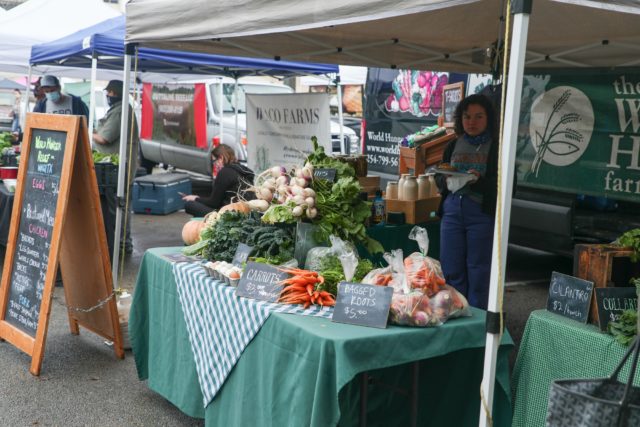By Christina Cannady | Staff Writer
2021 marks the 10th year of operation for the Waco Downtown Farmers Market. Despite hindrance from COVID-19, the market has continued to operate with appropriate guidelines to ensure fresh, local products reach the tables and homes of communities throughout Waco.
Upon moving to Waco 12 years ago, Executive Director of the Waco Downtown Farmers Market Bethel Erickson-Bruce was an intern at the World Hunger Relief Farm. Wanting to expand the availability of local produce, she and a handful of people began working to create a farmers market in the downtown area.
She followed a “build and they will come” approach, starting with just one vegetable farmer. Ten years later, the market has up to 12 produce vendors and up to 40 vendors total. Even as COVID-19 began business shutdowns, the market was deemed an essential business as a food establishment. During the pandemic as many were trapped indoors, the market thrived as a source of familiarity and community.
“We noticed an increase of traffic just as people were looking for something to actually get out and do, and feeling a little bit safer because it is outside. It’s been nice for us to be able to meet the need, but also fill that social experience for a lot of people,” Erickson-Bruce said.
Bullard junior Katy Dulany said she appreciates the precautions put in place so that she can continue to enjoy the market.
“It really is a glimpse into the heart and soul of the Waco community. It’s such a joy to walk around and see families with their little children, elderly couples holding hands, and always many dogs,” Dulany said. “Obviously things have looked different in Covid times, but everyone wears their mask and does a great job taking care of their community. I love being able to stay safe while getting my favorites from Waco Cha, or a yummy quesadilla, or eggs and more from the World Hunger Relief Farm.”
By supporting local farmers and vendors, people can stock their kitchens with fresh, sustainably grown food with a sound consciousness of our sustainable environment efforts. Bethel said how the Waco Downtown Farmers Market strives for a sustainable and environmentally friendly experience.
“We try to encourage as much low waste packaging by our producers and try to encourage our customers as well to bring their own shopping bags or their containers if they’re picking up food,” she said, also mentioning that the average mileage from farm to market is about 40 miles and farmers are encouraged to practice sustainable growing methods like “wise water consumption.”
In a world where convenience is a frequently purchased item, it’s important to remember that local businesses are what keep local economies flourishing. Although local businesses can be more expensive to support, there is the trade-off of ethical and community-oriented farming practices. It is necessary to support and protect the integrity of local farms in order to preserve the future of sustainable agriculture.
“If you spend your money with local producers, you’re much more likely to see that money stay in your local economy versus if you go to Walmart. Those are corporate dollars that are being shuttled off and not invested here in Waco,” Erickson-Bruce said. “So shopping with our vendors, you’re much more likely to be seeing them purchasing other things from small businesses in that same mentality of supporting one another.”
Although it may not seem like much, making small but conscious decisions about consumption habits will enable people to think deeper about the infrastructure of food production and take one step at a time toward a sustainable lifestyle.
“The small ways of investing in your community and supporting producers is multiplied beyond just getting to know your producer,” Erickson-Bruce said. “Your food at a farmers market comes with a story. You get to know your farmer and their family. And, again, it’s not a comparable experience to going to a grocery store.”



